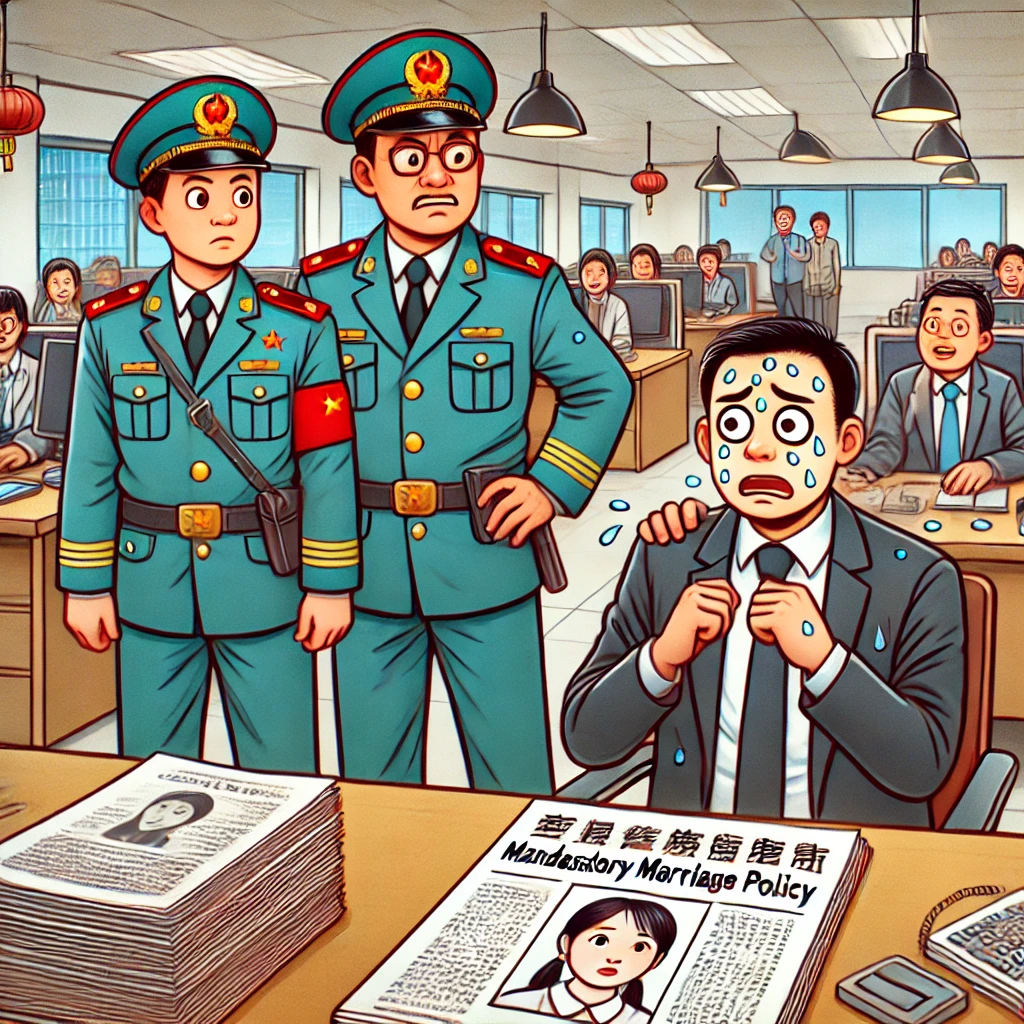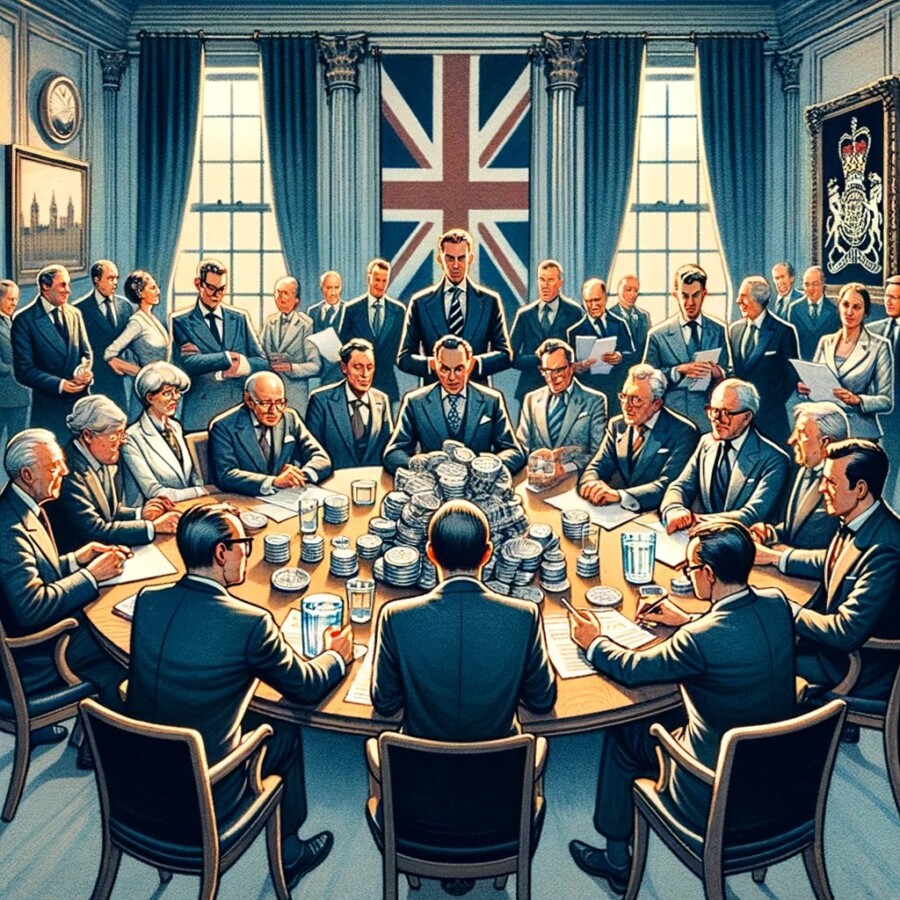A company in China has recently canceled a controversial rule that threatened to fire single workers if they didn’t get married by the end of September. The Shuntian Chemical Group, based in Shandong province, had sent a notice to its 1,200 employees, especially targeting those between the ages of 28 and 58. The notice told unmarried workers, including those who had been divorced, to “fix your personal marriage issues” by the deadline, or they would face consequences.
The company’s announcement included a series of steps for those who didn’t comply. At first, employees had to write a self-reflection if they were still single by the first quarter. If they didn’t marry by the second quarter, the company would evaluate their situation. Finally, if they didn’t start a family by the third quarter, they could lose their jobs. The notice even criticized single employees for not following the government’s encouragement to marry and have kids, calling them “disloyal” and “disobedient” to their parents.
This policy came about as part of a larger effort by the Chinese government to deal with the country’s falling birth rate. Officials have been pushing for more young people to marry and start families to help with this issue. However, many people reacted strongly against the Shuntian Chemical Group’s demands on social media, showing their disapproval of the company’s approach.
After the public backlash, local officials from the human resources and social security bureau stepped in and visited the company to point out that the policy broke Chinese labor laws. The day after this intervention, the Shuntian Chemical Group quickly retracted the notice. A company representative admitted that the wording in the announcement was inappropriate, which led to its cancellation. Recent statistics show that new marriages in China dropped by 20% last year, the biggest decline ever, and the population has decreased for the third year in a row, highlighting the difficulties the country faces with marriage and family issues.
Original news source: Chinese company that set deadline for single workers to get married responds to criticism (Sky News)
🎧 Listen:
Slow
Normal
Fast
📖 Vocabulary:
| 1 | controversial | Causing disagreement or discussion |
| 2 | threatened | Warned of harm or danger |
| 3 | comply | To follow rules or instructions |
| 4 | evaluate | To judge or assess something |
| 5 | disloyal | Not being faithful or trustworthy |
| 6 | disobedient | Not following rules or instructions |
| 7 | backlash | A strong negative reaction |
| 8 | intervention | Getting involved to change a situation |
| 9 | retracted | Took back or withdrew |
| 10 | inappropriate | Not suitable or proper |
| 11 | statistics | Numbers that show information |
| 12 | decline | A decrease or reduction |
| 13 | representative | A person who speaks or acts for others |
| 14 | announcement | A public statement or message |
| 15 | consequences | Results or effects of an action |
Group or Classroom Activities
Warm-up Activities:
– CHARADES
Instructions: Students will act out different scenarios related to marriage and family without speaking. Other students will guess what they are acting out. Scenarios can include getting married, proposing, having a child, or attending a wedding.
– OPINION SPECTRUM
Instructions: Create a line in the classroom with “Strongly Agree” on one end and “Strongly Disagree” on the other. Present statements related to marriage and family (e.g., “People should get married by a certain age”). Students will position themselves on the spectrum according to their opinions and then discuss their viewpoints with a partner.
– MIND MAP
Instructions: In small groups, students will create a mind map on the whiteboard related to the themes of marriage and family in different cultures. They should discuss and add terms, ideas, and concepts that come to mind, connecting them to the article’s context.
– VOCABULARY PICTIONARY
Instructions: Divide students into teams. Each team will select vocabulary words from the article (e.g., “disloyal,” “consequences,” “marriage”). One member will draw the word without using letters or numbers, while their team guesses what it is.
– FUTURE PREDICTIONS
Instructions: Students will write down their predictions about marriage trends in the future based on the article’s content. They will share their predictions with a partner and discuss what societal changes might lead to these trends.
🤔 Comprehension Questions:
1. What was the controversial rule that the Shuntian Chemical Group had for its single employees?
2. How did the company plan to evaluate unmarried employees throughout the year?
3. What reasons did the company give for pressuring employees to get married?
4. How did people react to the company’s demands on social media?
5. What role did local officials from the human resources and social security bureau play in this situation?
6. Why did the Shuntian Chemical Group decide to cancel the notice about the marriage policy?
7. What statistics were mentioned regarding marriage rates in China, and why are they significant?
8. How does this situation reflect the larger issue of marriage and family in China?
Go to answers ⇩
🎧✍️ Listen and Fill in the Gaps:
A company in China has recently canceled a controversial rule that threatened to fire (1)______ (2)______ if they didn’t get married by the end of (3)______. The Shuntian (4)______ Group, based in Shandong province, had sent a notice to its 1,200 employees, especially targeting those between the ages of 28 and 58. The notice told unmarried workers, including those who had been divorced, to “fix your personal marriage issues” by the deadline, or they would face consequences.
The company’s announcement included a series of steps for those who didn’t comply. At first, employees had to write a self-reflection if they were still single by the first quarter. If they didn’t marry by the second quarter, the company would evaluate their (5)______. Finally, if they didn’t (6)______ a family by the third quarter, they could lose their jobs. The notice even criticized single employees for not following the government’s (7)______ to marry and have kids, calling them “disloyal” and “disobedient” to their (8)______.
This policy came about as part of a (9)______ effort by the Chinese government to deal with the country’s (10)______ birth rate. Officials have been pushing for more young (11)______ to marry and start families to help with this issue. However, many people reacted strongly against the Shuntian Chemical Group’s demands on social media, (12)______ their disapproval of the company’s approach.
After the public backlash, local officials from the human resources and social security bureau stepped in and visited the company to point out that the policy broke Chinese labor laws. The day after this intervention, the Shuntian Chemical Group quickly retracted the notice. A company representative admitted that the wording in the announcement was inappropriate, which led to its cancellation. Recent statistics show that new (13)______ in (14)______ dropped by 20% last year, the biggest decline ever, and the population has decreased for the third year in a row, (15)______ the (16)______ the country faces with marriage and family issues.
Go to answers ⇩
💬 Discussion Questions:
Students can ask a partner these questions, or discuss them as a group.
1. What is your opinion on companies getting involved in their employees’ personal lives, like marriage?
2. How would you feel if your job required you to be married by a certain date?
3. Do you think it’s fair for a company to fire someone for being single? Why or why not?
4. What is a reasonable age for people to get married?
5. Do you like the idea of a company encouraging employees to marry? Why or why not?
6. How do you think societal pressure affects people’s decisions to marry?
7. Do you think the government should encourage people to marry and have children? Why or why not?
8. How would you react if your workplace tried to control your personal life like this?
9. What is your experience with family or friends feeling pressured to marry?
10. Do you think the decline in marriages is a problem? Why or why not?
11. How important do you believe marriage is in today’s society?
12. Do you think people should focus more on their careers or relationships? Why?
13. What is a positive aspect of being single that you can think of?
14. How would you feel if a friend was pressured to marry quickly?
15. Do you think companies should have policies about personal relationships? Why or why not?
Individual Activities
📖💭 Vocabulary Meanings:
Match each word to its meaning.
Words:
1. controversial
2. threatened
3. comply
4. evaluate
5. disloyal
6. disobedient
7. backlash
8. intervention
9. retracted
10. inappropriate
11. statistics
12. decline
13. representative
14. announcement
15. consequences
Meanings:
(A) Getting involved to change a situation
(B) Not following rules or instructions
(C) Not suitable or proper
(D) Results or effects of an action
(E) Warned of harm or danger
(F) Took back or withdrew
(G) Not being faithful or trustworthy
(H) A person who speaks or acts for others
(I) To judge or assess something
(J) A decrease or reduction
(K) A public statement or message
(L) A strong negative reaction
(M) Causing disagreement or discussion
(N) To follow rules or instructions
(O) Numbers that show information
Go to answers ⇩
🔡 Multiple Choice Questions:
1. What company in China canceled a controversial rule about marriage?
(a) Huawei
(b) Shuntian Chemical Group
(c) Alibaba
(d) Tencent
2. What age range did the company’s notice primarily target?
(a) 18 to 28
(b) 30 to 40
(c) 28 to 58
(d) 25 to 35
3. What did the notice require unmarried workers to do by the end of September?
(a) Get married
(b) Change jobs
(c) Move to a different city
(d) Take a vacation
4. What consequence did employees face if they did not comply with the company’s marriage policy?
(a) They would receive a bonus
(b) They would be promoted
(c) They could lose their jobs
(d) They would get a raise
5. What did the notice criticize single employees for not doing?
(a) Attending company events
(b) Following the government’s encouragement to marry
(c) Completing their work on time
(d) Participating in team-building activities
6. Why did local officials intervene with the Shuntian Chemical Group?
(a) The policy broke Chinese labor laws
(b) The company was underperforming financially
(c) Employees complained about their workload
(d) The company was expanding too quickly
7. What was the reaction of many people on social media regarding the company’s demands?
(a) They supported the company’s policy
(b) They ignored the issue
(c) They praised the company for its initiative
(d) They showed strong disapproval
8. What recent trend has been observed in new marriages in China?
(a) They increased significantly
(b) They remained the same
(c) They doubled in number
(d) They dropped by 20% last year
Go to answers ⇩
🕵️ True or False Questions:
1. Local officials did not intervene because the company’s policy followed Chinese labor laws.
2. The company had a series of rewards for single employees, including writing a self-reflection if they were still single after the first quarter.
3. The policy was part of a larger effort by the Chinese government to encourage marriage and increase the birth rate.
4. The Shuntian Chemical Group targeted workers of all ages with their marriage rule.
5. After the backlash, the Shuntian Chemical Group canceled the marriage rule and admitted the wording was inappropriate.
6. Many people reacted negatively to the company’s demands on social media, showing they didn’t agree with the approach.
7. Unmarried employees were told to “fix your personal marriage issues” or face consequences.
8. A company in China tried to promote single employees if they didn’t get married by the end of September.
Go to answers ⇩
📝 Write a Summary:
Write a summary of this news article in two sentences.
Check your writing now with the best free AI for English writing!
Writing Questions:
Answer the following questions. Write as much as you can for each answer.
Check your answers with our free English writing assistant!
1. What rule did the Shuntian Chemical Group create regarding single workers?
2. What were the consequences for employees who did not get married by the deadline?
3. Why did the Chinese government want more young people to marry and have families?
4. How did the public react to the company’s announcement about marriage?
5. What happened after local officials intervened regarding the company’s policy?
✅ Answers
🤔✅ Comprehension Question Answers:
1. What was the controversial rule that the Shuntian Chemical Group had for its single employees?
The controversial rule was that single employees would be fired if they didn’t get married by the end of September.
2. How did the company plan to evaluate unmarried employees throughout the year?
The company planned to evaluate unmarried employees by having them write a self-reflection if they were still single by the first quarter, then assessing their situation if they didn’t marry by the second quarter, and potentially firing them if they didn’t start a family by the third quarter.
3. What reasons did the company give for pressuring employees to get married?
The company claimed that single employees were “disloyal” and “disobedient” to their parents and criticized them for not following the government’s encouragement to marry and have kids.
4. How did people react to the company’s demands on social media?
People reacted strongly against the company’s demands, showing their disapproval and criticizing the approach taken by the Shuntian Chemical Group.
5. What role did local officials from the human resources and social security bureau play in this situation?
Local officials intervened by visiting the company to inform them that their policy broke Chinese labor laws, which led to the company retracting the notice.
6. Why did the Shuntian Chemical Group decide to cancel the notice about the marriage policy?
The company decided to cancel the notice because a representative admitted that the wording in the announcement was inappropriate after the public backlash and intervention from officials.
7. What statistics were mentioned regarding marriage rates in China, and why are they significant?
The statistics mentioned that new marriages in China dropped by 20% last year, which is the biggest decline ever, and the population has decreased for the third year in a row. These statistics are significant because they highlight the challenges China faces with marriage and family issues.
8. How does this situation reflect the larger issue of marriage and family in China?
This situation reflects the larger issue of marriage and family in China by showing the government’s concern over the declining birth rate and the pressure they put on individuals to marry and have children, as well as the backlash against such pressures from society.
Go back to questions ⇧
🎧✍️✅ Listen and Fill in the Gaps Answers:
(1) single
(2) workers
(3) September
(4) Chemical
(5) situation
(6) start
(7) encouragement
(8) parents
(9) larger
(10) falling
(11) people
(12) showing
(13) marriages
(14) China
(15) highlighting
(16) difficulties
Go back to questions ⇧
📖💭✅ Vocabulary Meanings Answers:
1. controversial
Answer: (M) Causing disagreement or discussion
2. threatened
Answer: (E) Warned of harm or danger
3. comply
Answer: (N) To follow rules or instructions
4. evaluate
Answer: (I) To judge or assess something
5. disloyal
Answer: (G) Not being faithful or trustworthy
6. disobedient
Answer: (B) Not following rules or instructions
7. backlash
Answer: (L) A strong negative reaction
8. intervention
Answer: (A) Getting involved to change a situation
9. retracted
Answer: (F) Took back or withdrew
10. inappropriate
Answer: (C) Not suitable or proper
11. statistics
Answer: (O) Numbers that show information
12. decline
Answer: (J) A decrease or reduction
13. representative
Answer: (H) A person who speaks or acts for others
14. announcement
Answer: (K) A public statement or message
15. consequences
Answer: (D) Results or effects of an action
Go back to questions ⇧
🔡✅ Multiple Choice Answers:
1. What company in China canceled a controversial rule about marriage?
Answer: (b) Shuntian Chemical Group
2. What age range did the company’s notice primarily target?
Answer: (c) 28 to 58
3. What did the notice require unmarried workers to do by the end of September?
Answer: (a) Get married
4. What consequence did employees face if they did not comply with the company’s marriage policy?
Answer: (c) They could lose their jobs
5. What did the notice criticize single employees for not doing?
Answer: (b) Following the government’s encouragement to marry
6. Why did local officials intervene with the Shuntian Chemical Group?
Answer: (a) The policy broke Chinese labor laws
7. What was the reaction of many people on social media regarding the company’s demands?
Answer: (d) They showed strong disapproval
8. What recent trend has been observed in new marriages in China?
Answer: (d) They dropped by 20% last year
Go back to questions ⇧
🕵️✅ True or False Answers:
1. Local officials did not intervene because the company’s policy followed Chinese labor laws. (Answer: False)
2. The company had a series of rewards for single employees, including writing a self-reflection if they were still single after the first quarter. (Answer: False)
3. The policy was part of a larger effort by the Chinese government to encourage marriage and increase the birth rate. (Answer: True)
4. The Shuntian Chemical Group targeted workers of all ages with their marriage rule. (Answer: False)
5. After the backlash, the Shuntian Chemical Group canceled the marriage rule and admitted the wording was inappropriate. (Answer: True)
6. Many people reacted negatively to the company’s demands on social media, showing they didn’t agree with the approach. (Answer: True)
7. Unmarried employees were told to “fix your personal marriage issues” or face consequences. (Answer: True)
8. A company in China tried to promote single employees if they didn’t get married by the end of September. (Answer: False)
Go back to questions ⇧













